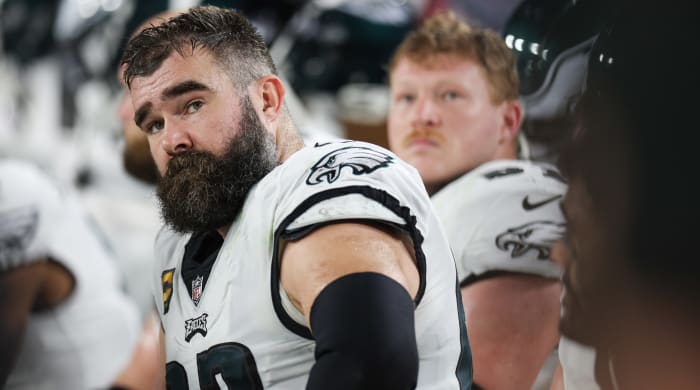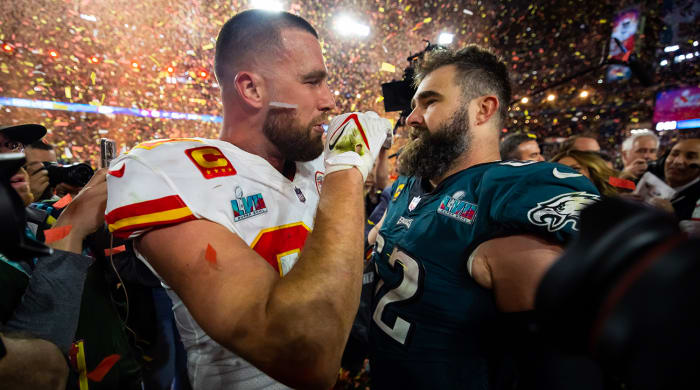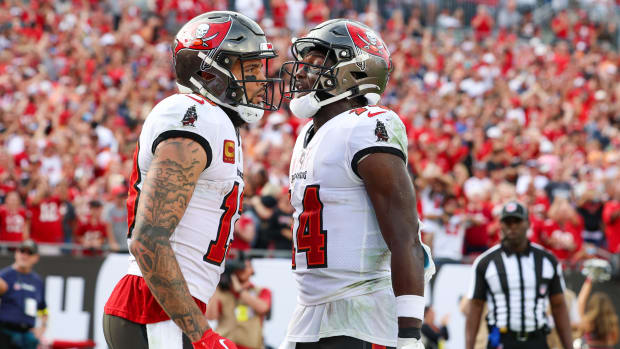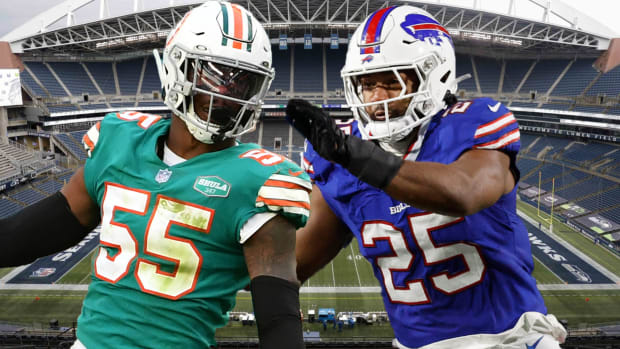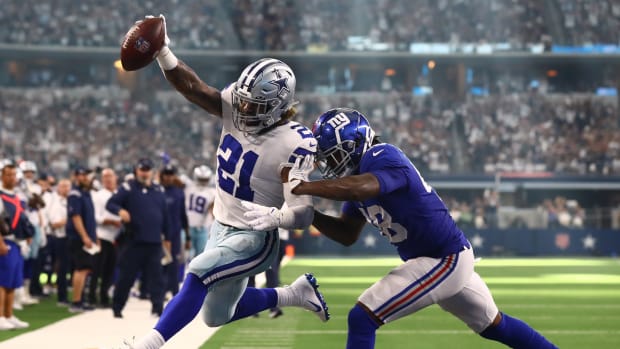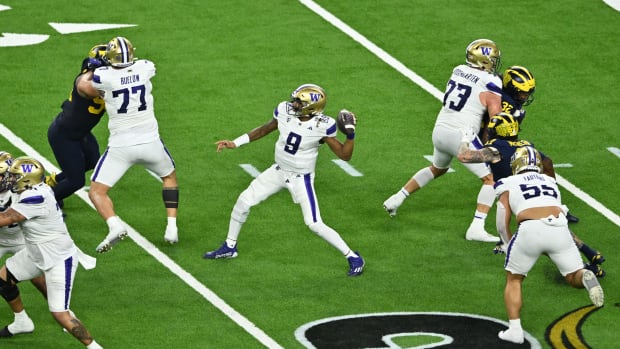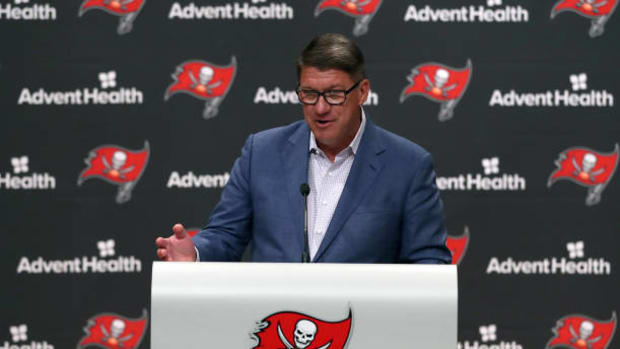Jason Kelce’s Legacy Puts Him In an Untouched Category
Ever since Jason Kelce did both the obvious and the unthinkable, retiring after 13 glorious, successful-beyond-reasonable-expectations, beer-soaked NFL seasons, his legend has only grown. Legend, in this case, isn’t overstated. Kelce became a one-person category, the rare center who was famous and relatable and yet never acted like a celebrity. He sang. He chugged. He pancake-blocked. And, through all that and much more, he fashioned one of the most fascinating legacies in sports.
To that end, having amassed tons of Kelce reporting over the years, it seemed prudent to look back—at the man; never a myth, forever a legend. This is Jason Kelce, in all his distinct glory.
Consider the best centers in NFL history. A Jim Otto. A Chuck Bednarik. A Mel Hein or a Dwight Stephenson. A Mike Webster, Dermontti Dawsonor Randy Cross. There’s a Ringo in that group (Otto, Green Bay Packers), a four-time Super Bowl champion (Webster) and more than a dozen Hall of Famers. But how many of the best-ever centers also commanded entire locker rooms, even above superstars who made more money and endorsed more products and couldn’t chug a beer to save their lives? None. Not in the way that Kelce did.
Kelce was the wheel around which every other spoke in the Philadelphia Eagles locker room rotated. This sentiment became so obvious that when a young quarterback was navigating the treacherous route from doubted prospect to locker room linchpin, he decided the best way to elevate both his leadership style and impact was to study the center everyone else looked toward. So Jalen Hurts decided to (1) befriend Kelce, (2) learn from him, while studying him up close and (3) apply those lessons in a leadership handoff of sorts.
The Eagles don’t reach Super Bowl LVII if Kelce doesn’t aid in Hurts’s development. Not even the on-field variety, although Kelce certainly helped there, too. Kelce, Hurts told Sports Illustrated in 2023, is “a special guy, a special leader. He’s one of the best players I’ve ever played with—at any position. Maybe the best leader. Smart. Football intelligence. Fundamentals. Knows how to maneuver and play.”
The funny part is, when the Eagles drafted Hurts in 2020, the quarterback “didn’t know anything about [Kelce].” But after only a few seasons together, Hurts said that Kelce supported and endorsed him “before anybody else did.”
That’s Kelce’s legacy: stamping imprints, on a franchise, its locker rooms, teammates and much more.
Late in his career, Kelce appeared to recognize Hurts’s intentions. There was only one thing the center wasn’t protective of, and that was his own status within the Eagles locker room. Without saying much of anything, according to Averion Hurts Sr., the quarterback’s father, Kelce “passed the torch to him.”
That gesture meant more than might be obvious. Many superstars in Kelce’s position would have never considered stepping even slightly back (still leading, just in a slightly different way).
That’s Kelce’s legacy, too, from being in college at Cincinnati to sticking in the NFL against expectations: adaptability, finding ways that most believe don’t exist.
The Eagles’ offensive linemen like to say they’re students at Stoutland University. That’s a complimentary nod to their position coach, the longtime and respected O-line guru, Jeff Stoutland. Consider Kelce his best-ever student. His influence was pivotal in Kelce’s career longevity and something even rarer—the center’s ability to play his best, most impactful football, after being in the league for around a decade.
That’s also Kelce’s legacy: never stopped learning or improving.
Other, more well-known performers took notice. This, from DJ Jazzy Jeff of The Fresh Prince of Bel-Air and music fame, shows the reach that a center who wasn’t supposed to stick in the NFL eventually garnered.
“I’ve always been a major fan of Jason Kelce. (He) embodies Philadelphia. Through and through, he’s been here. I was so excited to meet him and even more excited that he was a fan of mine. That’s what it’s really about.”
That’s more legacy: the nearly unheard of ability to rank among the most relatable superstars in sports and still draw the attention of the famous, who respect his craft, bearing and approach.
Before the LVII loss, team owner Jeffrey Lurie considered Kelce’s impact the week before that championship game. The 72-year-old nearly leapt from his chair to describe how deep it was, how much it meant to the Eagles franchise beyond any team in any one season. Lurie laid out Kelce’s vast influence under one umbrella, that of a cornerstone. That’s maybe the most important part of Kelce’s legacy.
“There can be none better,” Lurie said. “Yeah, I mean, none.”
Lurie mentioned the injuries Kelce played through, the pain he endured, the sacrifices he made. His career never unfolded in a way that might be described as smooth. But Kelce, Lurie noted, was undersized, which meant he learned how to adjust his movements and angles in ways, the owner says, that “revolutionized his position.”
As he finished that sentence, Lurie needed to head out to the Eagles temporary practice field. He asked me to come back after, because he had more about Kelce specially to share.
“At the same time,” Lurie said upon resuming, “no better teammate has ever played for the Philadelphia Eagles, nor represented the city better than Jason Kelce. I mean, Jesus, we can all learn from him.”
Asked if Kelce might retire after that Super Bowl, especially if Philadelphia triumphed, Lurie waved away the question. He didn’t want to entertain the possibility, even.
Kelce altered every room he entered. In the best ways, mostly. That applied to arenas, where cameras inevitably pointed his way whether he was wearing a shirt or not, often while he dumped a beer down his throat in a matter of seconds. That applied to his foray into podcasting with his younger brother, Travis, and their show’s steep and sudden climb up the listening charts. That even applied to the Kansas City Chiefs’ dynasty.
In early 2020, back when Kansas City had gone half a century without a championship, Jason visited Travis at the Chiefs hotel. Older brother took younger brother to the patio out back, their father, Ed Kelce, told my colleague, Conor Orr, before the game. Ed said Jason must have been wondering why Philadelphia wasn’t in that game; he must have been bummed. But he still gave Travis critical advice: “Don’t overthink it. You know what you do well.”
The Chiefs won that week, setting the latest NFL dynasty in motion.
That’s Jason’s legacy: change, whether to rooms, teams, seasons or arenas.
Also: the man can sing. Eliza Hardy Jones, the Philadelphia native and singer in the band The War on Drugs, told my former colleague Mitch Goldich, about her time as a vocal coach with the offensive line for their wildly popular albums of Christmas songs.
Kelce told Hardy Jones that he, Lane Johnson and Jordan Mailata (who has beautiful pipes and once competed in a television show-singing competition) liked to sing—sing!—together in the locker room. One random afternoon, Kelce just spit out, “I wish we could make a Christmas album.”
So they did, with an assist from Connor Barwin. Hardy Jones loved the silliness baked into the concept but never considered the album to be a joke. Nor did Kelce, or any of his linemates. In fact, he went so far as to recruit star players such as Hurts to make cameos, in order to ensure it would be as successful as possible. She found Kelce to be … confident in his voice … sure in his singing style … a little wild overall … and very much himself. He had great pitch. He took direction. He even struck her as vulnerable.
“Jason Kelce is a Philadelphia legend,” Hardy Jones told Goldich. “He is beloved by all. He’s the guy who’s gonna bring people together. But seeing him in real life doing those things, you could just feel it. You could feel how powerful his personality was. And how so much of his personality is led by warmth and love and joy, and it definitely made football way more fun for me this season.”
She added: “It’s really true. You can feel the difference with a team, or with a band, when everybody is in sync and is operating from a place of love and compassion.”
That’s Kelce’s impact, too: connective tissue, in human form.
Let’s not forget. The dude could play. That means baritone saxophone—in his high school jazz band. And that means football, NFL football, to the tune of seven Pro Bowls, six first-team All Pro nods and, in all likelihood, a spot in the Hall of Fame.
Kelce was also available. In all but one of his 13 seasons, he played at least 89% of his team’s offensive snaps. In four seasons, he played every offensive snap. Hence why GM Howie Roseman made convincing Kelce to return part of his plan for each recent NFL offseason.
More legacy: Hall of Fame talent that Kelce, along with everyone who helped him, created.
After the LVII loss, Hurts’s brother, Averion Jr., said he planned to “hope and pray Kelce can come back another year, just because of the connection those guys have.”
Legacy: in demand, for everything above.
It’s fair to say that Kelce changed league history, not just at his position but with the success of Philadelphia’s infamous “Tush Push” play. Forget, for now, all the hand-wringing over whether the play is legal, whether it’s sporting or whether it’s going to be allowed next season. Part of the reason that play ranks as the most successful quarterback sneak, ever, in the NFL, is because Kelce powered the whole thing.
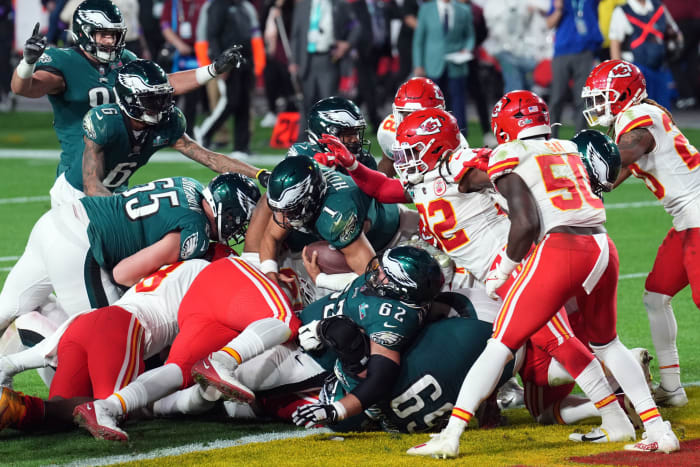
Kelce has been selected as a first-team All-Pro in each of the last three seasons.
Joe Camporeale/USA TODAY Sports
As we wrote in a Tush Push story this past season: The Tush Push has become automatic in one place and, so far, in only one place. “We took a QB sneak, already a high-success-rate play, and we made it damn near unbeatable,” one staffer says, in summation. “It’s simplistic. But it’s innovative—because there’s a lot of technique to it.”
That starts with Kelce. The Tush Push isn’t the same without him.
Legacy on top of legacy: in this case, innovation.
This exercise could go on for days, with enough anecdotes to fill a book. But it’s far more Kelce-like to end with a word beer chug of sorts. In a copycat league, where most centers are lucky if they’re anonymous, he wasn’t just an outlier. He was a category unto himself. And, as far as legacies go, that’s the most distinct and multifaceted one in recent memory. His impact, in all facets, will be missed.


































